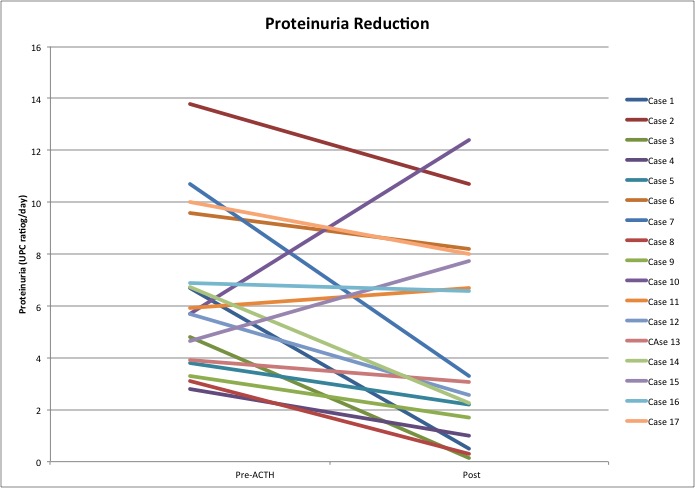Treatment of Post-Transplant Nephrotic Syndrome with Adrenocorticotropic (ACTH) Gel.
1Medstar Georgetown Transplant Institute, Washington DC
2Indiana University Health, Indianapolis
Meeting: 2017 American Transplant Congress
Abstract number: B163
Keywords: Immunosuppression, Kidney transplantation, Proteinuria
Session Information
Session Name: Poster Session B: Kidney Complications II
Session Type: Poster Session
Date: Sunday, April 30, 2017
Session Time: 6:00pm-7:00pm
 Presentation Time: 6:00pm-7:00pm
Presentation Time: 6:00pm-7:00pm
Location: Hall D1
Objectives: Post-kidney transplant proteinuria due to recurrent GN is considered to be a significant risk factor negatively affecting kidney transplant survival. In this case series we report our experience at 2 institutions with using ACTH (Adreno-corticotropic Hormone) to reduce proteinuria.
Materials and Methods: We retrospectively reviewed the available data and outcomes of the 19 transplant recipients who underwent treatment with ACTH at our institution.
Results: Mean age was 44.5+/-14.9 years (15-68); M:F 16:3; Whites: African Americans 9:8, Living Donor transplant 10/19. Indication for ACTH use was recurrent FSGS in 14, recurrent MGN in 2 and 3 others. Induction therapy : 10 Alemtuzemab: 9 Anti-thymocyte globulin. Patients were on variable immunosuppression at baseline and were adjusted or altered based on clinical status and individual provider preference. All patients were on ACE-I. 15/19 patients received steroids as part of treatment, while 9/19 patients received Plasma Exchange.
Median duration from transplant to ACTH use was 11.2 months (0-124). Median duration from diagnosis of recurrence to ACTH use was 6.9 months (0-47).
The mean starting and ending serum creatinine was 2.7+/-2.2 (1.0-10.1) and 3.6+/-2.7 mg/dL respectively, while mean Pre-ACTH and Post-ACTH or last follow up urine protein to creatinine ratio (UPC) was 6.3+/-2.9 and 4.4+/-3.8 respectively. ACTH was used at a dose of 40-80 units subcutaneously twice a week. The median treatment duration was 6.1 months (range 1.6-20.8). At end of ACTH or last follow up 8/17 (47%) of patients showed a 50% or more reduction in proteinuria from pre-ACTH levels. 7/17 (41.1%) showed less than 50% reduction, while 2/17 showed no change or worsening of proteinuria. Mean reduction was 39.8+/-52%. 4/17 cases achieved complete remission of nephrotic syndrome.  Conclusions: In conclusion, we describe to date the largest series of ACTH use in the post-transplant setting. It appears that ACTH has a partial role in proteinuria response but until larger long term randomized studies are conducted, its use should still be considered with caution.
Conclusions: In conclusion, we describe to date the largest series of ACTH use in the post-transplant setting. It appears that ACTH has a partial role in proteinuria response but until larger long term randomized studies are conducted, its use should still be considered with caution.
CITATION INFORMATION: Khalil A, Karabala A, Sharfuddin A, Grafals M. Treatment of Post-Transplant Nephrotic Syndrome with Adrenocorticotropic (ACTH) Gel. Am J Transplant. 2017;17 (suppl 3).
To cite this abstract in AMA style:
Khalil A, Karabala A, Sharfuddin A, Grafals M. Treatment of Post-Transplant Nephrotic Syndrome with Adrenocorticotropic (ACTH) Gel. [abstract]. Am J Transplant. 2017; 17 (suppl 3). https://atcmeetingabstracts.com/abstract/treatment-of-post-transplant-nephrotic-syndrome-with-adrenocorticotropic-acth-gel/. Accessed February 16, 2026.« Back to 2017 American Transplant Congress
